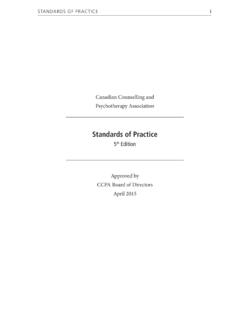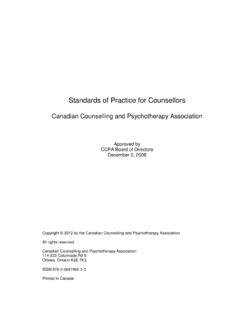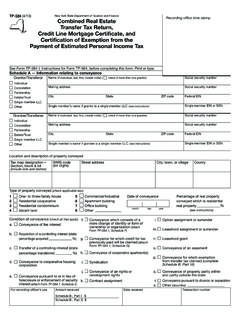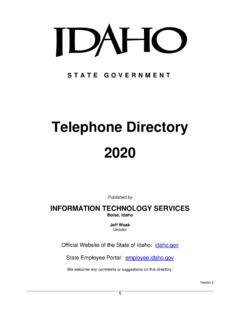Transcription of Regulation for School Counsellors by Province
1 1 Regulation for School Counsellors by Province Current as of November 23, 2012 Few provinces have strong regulations in place for School Counsellors ; only six provinces have explicit policies allowing localities to make hiring decisions if there is a shortage of qualified candidates. Even in provinces where training at an approved program is required, the institution has significant latitude in establishing the coursework and standards through negotiation with professional organizations or accrediting bodies. The end result is that even in regulated provinces, counsellor preparation may vary considerably by institution. Please select a Province below to view information on counsellor Regulation specific to that Province . You may also click here for a summary table containing the pan-canadian requirements for School Counsellors . Provinces ALBERTA .. 2 BRITISH COLUMBIA .. 3 MANITOBA .. 4 NEW BRUNSWICK .. 5 NEWFOUNDLAND AND LABRADOR .. 8 NORTHWEST TERRITORIES.
2 9 NOVA SCOTIA .. 10 ONTARIO .. 11 PRINCE EDWARD 12 QU BEC .. 13 SASKATCHEWAN .. 14 YUKON .. 15 2 Alberta In Alberta, one or more of the following groups may provide School counselling services: Teachers certificated teachers who are members of the Alberta Teachers Association (ATA). Social Workers members of the Alberta College of Social Workers. Psychologists regulated members of the College of Alberta Psychologists. Sometimes these professionals may work alone; sometimes as a part of a multi-disciplinary team within the School . This team may consist of the following individuals or professionals: School principal; School counsellor who is a certificated member of the ATA with additional training in School counselling; teachers as student advocates; social workers or family/ School liaison workers and School psychologists. Other professionals may also work with this team, including child development assistants, mental health workers, nurses and police officers.
3 Counsellors may be employees of the School board or they may be hired under contract to work for the School board and provide counselling services in one or more schools. All of these practitioners work under a Code of Ethics published by their respected College. Educational requirements In Alberta, the issuance of a teaching certificate is based upon the Certification of Teachers Regulation , which requires that applicants have completed a Bachelor of Education ( ) degree or equivalent. Policy Guidance and Counselling states that School boards should employ professionally trained Counsellors who have had successful teaching experience. For schools that do not have a counsellor, the School board should ensure that guidance and counselling services are available to the students. This policy is currently under review. Sources FOIP (2007). Guide to Providing Counselling Services In School Jurisdictions. Governement of Alberta. Alberta Teacher's Association Policy Resolutions May 2007.
4 3 British Columbia British Columbia (BC) School Counsellors are allowed to practice counselling in schools through their certification as teachers by the Government of BC's Ministry of Education. The Teacher Regulation Branch (TRB), part of the Ministry of Education, works within a legislative mandate to ensure that educators in the K-12 School systems in BC meet and maintain the high standards of competence and conduct required to keep students safe and foster public trust and confidence in the teaching profession. The British Columbia College of Teachers (BCCT) was formerly the professional self-regulatory body for teachers in BC. It was responsible for setting and enforcing standards for teachers in the Province . It assesses applicants to the profession and issues teaching certificates. In 2011, as a result of a report commissioned by the government of BC, the BCCT was abolished and replaced by the Teacher Regulation Branch of the Ministry of Education on January 9, 2012.
5 Currently, counselling in BC is an unregulated profession, despite a decade-long effort initiated by the British Columbia Association of Clinical Counsellors (BCACC) to have counselling included in the Health Professions Act. Similarly, other than licensure by the Ministry of Education, School Counsellors are not regulated, although the British Columbia Teachers Federation (BCTF) supports a Provincial Specialist Association (PSA) of teacher- Counsellors , the British Columbia School Counsellors ' Association (BCSCA). Because there are no legislated qualifications for Counsellors in general or School Counsellors specifically, enforcement of these standards is voluntary. As with other provinces, there are no accrediting bodies. Educational requirements The BC Ministry of Education s Special Education Services: A Manual of Policies, Procedures and Guidelines (2013), states that School Counsellors should have a professional teaching certificate and a master s degree recognized by the Ministry in counselling psychology or a related discipline with a focus on counselling.
6 The minimal recommended standards of the BCACC and those recommended in the Special Education Services: A Manual of Policies, Procedures and Guidelines (2013) are similar, and revolve around possession of a master s degree in counselling or a related discipline. More specifically, BCACC requires specific specialized counselling-based coursework ( , diversity, group, family counselling/counselling ethics) and a specified number of direct or videotaped supervised practicum hours. Source Keats, and Laitsch, D. (2010). Contemplating Regulation of Counsellors in Canadian Schools: Current Issues and Concerns. Canadian Journal of Educational Administration and Policy, Issue #108, July 14, 2010. 4 Manitoba Manitoba School Counsellors are allowed to practice counselling in schools through their certification as teachers by the Department of Education and Literacy. A valid Manitoba certificate must be held in order to be employed as professional School personnel in Manitoba.
7 Professional School personnel include the classroom teacher, clinician, vocational teacher, School counsellor, special education teacher and special education coordinator, level 1 and level 2 administrator. Educational requirements To be eligible for a School Counsellor Certificate, a candidate must have thirty (30) credit hours of university course work at the post-baccalaureate level, or above, as specified in the guideline and will have accumulated a minimum of two (2) years successful teaching experience while holding a valid Manitoba Permanent Professional teaching certificate Sources Government of Manitoba Education and Literacy Professional Certification. 5 New Brunswick Application Requirements for a New Brunswick Guidance Counsellor Certificate or the New Brunswick Guidance Teacher Certificate: 3 years of teaching experience and Certificate V; OR Equivalent training and experience recognized by the Minister at the request of the School District Superintendant.
8 (Letter of support addressed to the Minister of Education, CC Dir of Student Services) Certification Options: 1. New Brunswick Guidance Counsellor Candidates must complete a Master Degree with a minimum of 10 recognized graduate level courses. Applicants must meet the 3 following requirements: a. 2 Compulsory Courses: Counselling Theory Counselling Practicum b. 4 Other Approved Counselling Courses from the following list. Recommended courses have been identified to enhance the delivery of the NB Comprehensive and Developmental model. Please note that this is a recommendation only. Assessment and Testing At- Risk Students Behaviour and Emotional Disorders Career Development (recommended for middle/ high School Counsellors ) Child Development Comprehensive and Developmental Guidance (recommended) Counselling Ethics (recommended) Counselling Skills (recommended) Counselling in Specialized Settings Consultation Methods Gender Issues Group Counselling (recommended) Learning and Human Development Multicultural Counselling Psychological Education Research and Evaluation c.
9 4 Other Graduate Level Courses (subject to approval) 2. New Brunswick Guidance Teacher Candidates must complete 15 credits from the following list of approved cniversity counselling courses at the graduate or 5000 Undergraduate Level (3 credits are awarded for each completed course from the list below): 6 At- Risk Students Behavioural & Emotional Disorders Career Development (recommended for middle and high School ) Comprehensive and Developmental Guidance (recommended) Consultation Methods Counselling Ethics (recommended) Counselling Theory (recommended) Counselling Practicum (recommended) Counselling Skills (recommended) Counselling in Specialized Settings Group Counselling (recommended) Gender Issues Learning and Human Development Multicultural Counselling Psychological Education Or candidates may complete a combination of both university courses listed above and the following. Department of Education Guidance Modules 1 credit is awarded for participation in a 6 hour Department of Education Module.
10 District Guidance Modules 1 credit is awarded for participation in a 6 hour District-Lead Guidance Module; of a credit is awarded for participation in a 3 hour District-Lead Guidance Module. Professional Development Activities as Pre-approved by the Canadian Counselling and Psychotherapy Association (CCPA). The Department of Education will award the equivalent number of credits as determined by the CCPA for Continuing Education Credits (CEC). Counselling-related Educational Conference not listed on the CCPA website must be pre-approved by the Department of Education. Application Forms are to be submitted to the Department of Education for approval 2 weeks prior to the event. If approved, applicants can expect to receive approximately 1 credit for participation in a 6 hour professional development/conference. Application Procedure Upon completion of the training outlined above, the candidate must apply to the Educational Programs and Services Branch of the Department of Education for a New Brunswick Guidance certificate.







